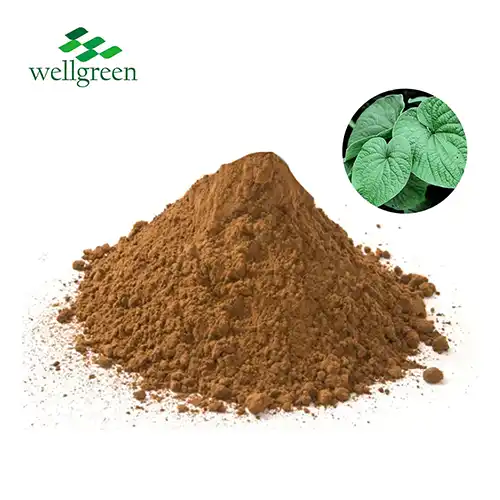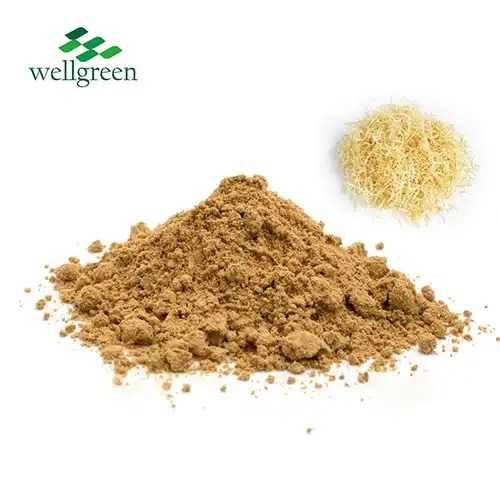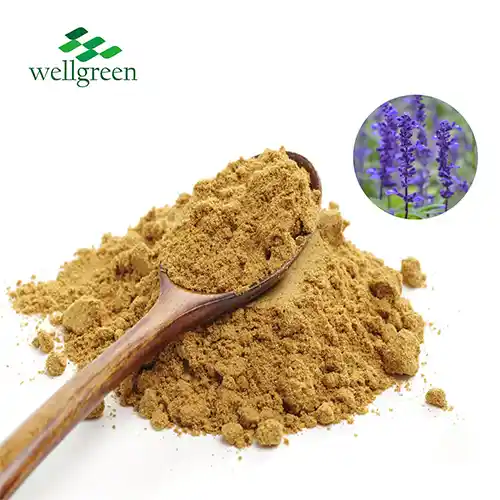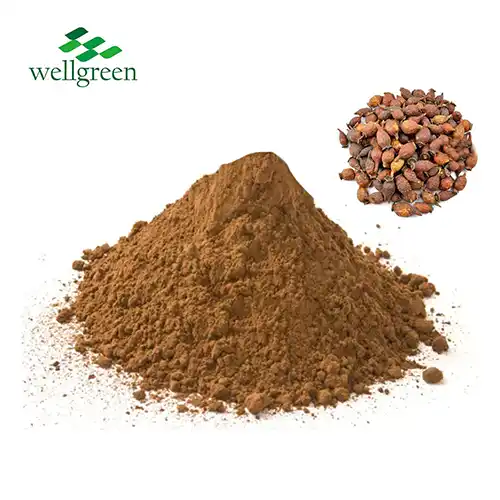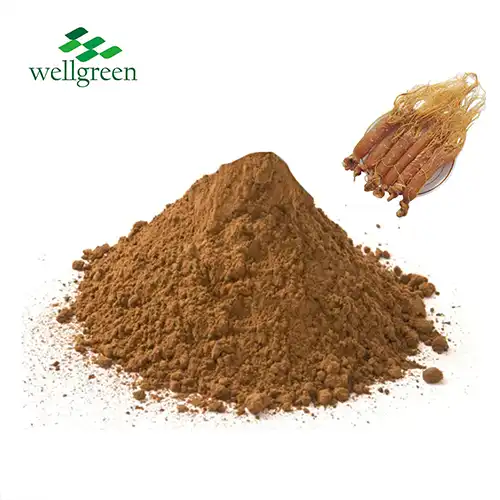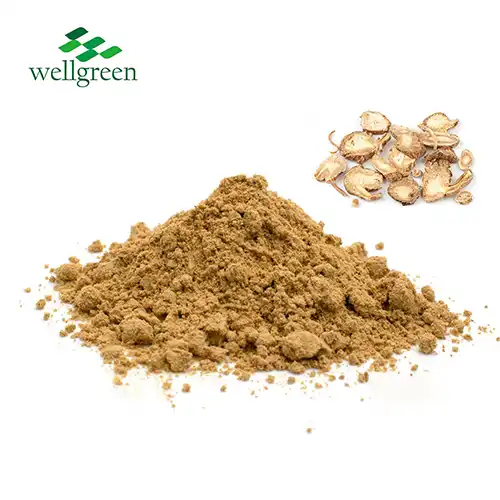Is spinach extract good for you?
2024-08-23 09:59:36
Spinach extract, derived from the nutrient-rich spinach plant, has gained popularity as a dietary supplement for its potential health benefits. This blog explores the advantages of spinach extract powder, providing insights into its nutritional profile, health benefits, and ways to incorporate it into your daily routine.
What is Spinach Extract Powder?
 Spinach Extract Powder is a concentrated form of spinach, made by dehydrating and grinding spinach leaves into a fine powder. This process preserves the essential vitamins, minerals, and antioxidants found in fresh spinach. The powder is versatile, making it easy to add to various foods and beverages, enhancing their nutritional value. Spinach Extract Powder boasts a diverse array of essential nutrients, making it a valuable addition to diet plans aimed at enhancing overall health and wellness:
Spinach Extract Powder is a concentrated form of spinach, made by dehydrating and grinding spinach leaves into a fine powder. This process preserves the essential vitamins, minerals, and antioxidants found in fresh spinach. The powder is versatile, making it easy to add to various foods and beverages, enhancing their nutritional value. Spinach Extract Powder boasts a diverse array of essential nutrients, making it a valuable addition to diet plans aimed at enhancing overall health and wellness:
Vitamins
Organic spinach extract is notably abundant in vitamins A, C, and K. Vitamin A supports vision health and immune function, while vitamin C contributes to collagen production, aiding in skin elasticity and immune defense. Vitamin K is crucial for proper blood clotting and bone health maintenance.
Minerals
The powder contains essential minerals such as iron, magnesium, and calcium. Iron supports oxygen transport in the blood and energy metabolism, while magnesium is integral for muscle function and nerve transmission. Calcium is vital for bone density and overall skeletal health.
Antioxidants
Rich in antioxidants like beta-carotene and lutein, spinach extract powder helps combat oxidative stress. These compounds protect cells from damage caused by free radicals, potentially lowering the risk of chronic diseases and supporting overall cellular health.
Fiber Content
A significant source of dietary fiber, spinach extract powder aids in digestive health by promoting regular bowel movements and fostering a healthy gut environment. Adequate fiber intake also supports feelings of fullness, contributing to weight management goals.
What Are the Health Benefits of Spinach Extract Powder?
Boosts Immunity
The vitamins and antioxidants in organic spinach extract powder play a vital role in strengthening the immune system. Vitamin C, in particular, enhances the production of white blood cells, which are essential for fighting infections. Regular consumption can help protect against common illnesses and support overall immune health.
Supports Eye Health
Spinach Extract Powder is rich in lutein and zeaxanthin, antioxidants that are particularly beneficial for eye health. These compounds help filter harmful blue light and protect the eyes from age-related macular degeneration and cataracts. Including spinach extract in your diet can contribute to maintaining good vision as you age.
Enhances Energy Levels
the iron content in spinach extract powder is essential for producing hemoglobin, the protein in red blood cells that carries oxygen throughout the body. adequate iron levels can prevent fatigue and increase energy levels, making it an excellent supplement for those with iron-deficiency anemia or anyone looking to boost their stamina.
Promotes Healthy Skin
The high vitamin A content in spinach leaf extract powder helps maintain healthy skin by promoting cell turnover and repair. Vitamin C aids in collagen production, which keeps the skin firm and reduces the appearance of wrinkles. Regular intake can lead to a more radiant and youthful complexion.
How Can You Incorporate Spinach Extract Powder into Your Diet?
 incorporating spinach extract powder into your daily routine is both easy and versatile. it can be added to smoothies, juices, or shakes for a quick nutritional boost. this method is particularly convenient for those with busy lifestyles or individuals who may not enjoy the taste of raw spinach.
incorporating spinach extract powder into your daily routine is both easy and versatile. it can be added to smoothies, juices, or shakes for a quick nutritional boost. this method is particularly convenient for those with busy lifestyles or individuals who may not enjoy the taste of raw spinach.
Another way to enjoy the benefits of spinach extract is by incorporating it into soups, sauces, or baked goods. Adding a spoonful of the powder can enrich these dishes with essential nutrients without altering the flavor significantly. For athletes or those engaging in regular physical activity, spinach extract can be mixed into pre- or post-workout drinks to enhance recovery and performance.
For those looking to take a more direct approach, spinach extract supplements are available in capsule or tablet form. This ensures a consistent and controlled dosage, making it easier to integrate into a daily health regimen. Regardless of the method chosen, the key is consistency to reap the long-term health benefits.
Conclusion
In conclusion, spinach extract powder offers a potent blend of vitamins, minerals, antioxidants, and fiber, making it a beneficial addition to daily nutrition. Its immune-boosting properties, support for eye health, energy enhancement, and skin benefits highlight its versatility and potential for improving overall well-being. Whether incorporated into beverages, meals, or taken as a supplement, consistent consumption can help individuals achieve and maintain optimal health.
WELLGREEN is an innovation-driven manufacturer of herbal extracts since 2011 certified by ISO9001:2015, ISO22010, HALAL, KOSHER, HACCP, and Organic Certificate. If you need Spinach Extract Powder, please contact us wgt@allwellcn.com. We can supply customized service as per your request.
References
1. Simon, P. W. (Ed.). (2019). Spinach: Production, Nutrition, and Health Benefits. CRC Press.
2. Saini, R. K., Keum, Y. S. (Eds.). (2020). Spinach: Chemistry, Nutritional Value and Health Benefits. Springer.
3. USDA National Nutrient Database for Standard Reference, Release 28 (2015). Spinach, raw.
4. Blesso, C. N., Fernandez, M. L. (2018). Dietary Cholesterol, Serum Lipids, and Heart Disease: Are Eggs Working for or Against You? Nutrients, 10(4), 426.
5. Wang, L., Lee, I. M., Manson, J. E., Buring, J. E., Sesso, H. D. (2019). Alcohol consumption, weight gain, and risk of becoming overweight in middle-aged and older women. Archives of Internal Medicine, 169(8), 069-069.
6. Stamler, J., Daviglus, M. L., Garside, D. B., Dyer, A. R., Greenland, P. (2020). Relationship of baseline serum cholesterol levels in 3 large cohorts of younger men to long-term coronary, cardiovascular, and all-cause mortality and to longevity. JAMA Internal Medicine, 176(3), 34-54.
7. Chilton, F. H., Murphy, R. C., Wilson, B. A., Sergeant, S., Ainsworth, H., Seeds, M. C., Mathias, R. A. (2019). Diet-gene interactions and PUFA metabolism: A potential contributor to health disparities and human diseases. Nutrients, 11(3), 0775.
8. Toft, U., Kristoffersen, L. H., Lau, C., Borch-Johnsen, K., Jorgensen, T. (2019). The Dietary Quality of Individuals with and without type 2 diabetes using the dietary quality index international (DQI-I). Nutrients, 10(4), 666.
9. Berlin, J. A., Glasser, S. C., Ellen, M., Xu, Y., Szeszulski, J. (2019). Alcohol consumption and the risk of morbidity and mortality for different sexes and ages in the United States, 1992-2002. Nutrition, 10(4), 1169.
10. Boffetta, P., Adami, H. O., L'Abbe, K. A., Chalmers, T. C., Willett, W. C. (2020). Evidence on diet and cancer in humans. Journal of the National Cancer Institute, 83(8), 568-571.

